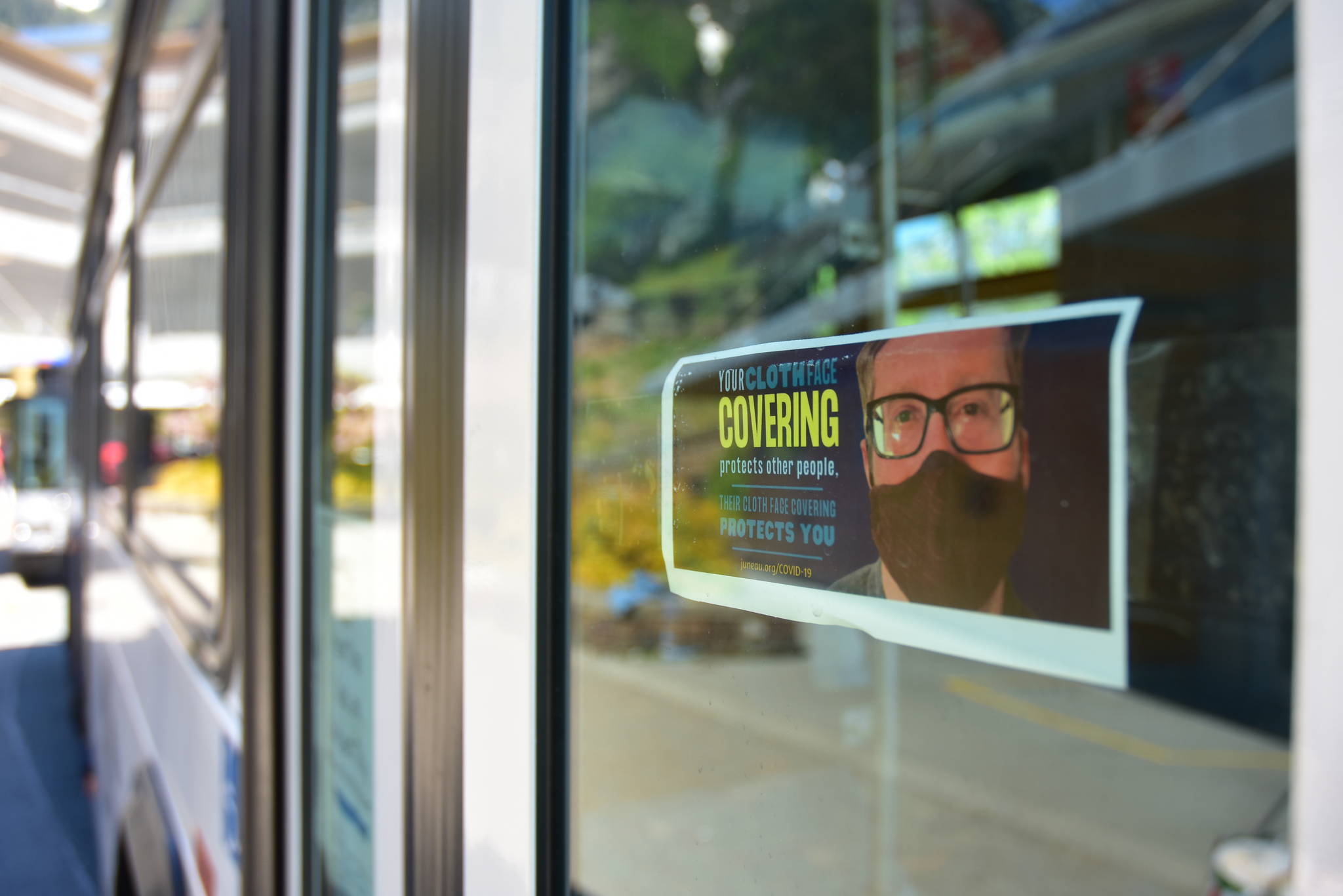A recent uptick in coronavirus cases in Juneau, mirrored by a more drastic increase across Alaska, has the City and Borough of Juneau encouraging precautions.
While there is some infection of vaccinated individuals, said state epidemiologist Dr. Joe McLaughlin, those who have chosen not get vaccinated represent the large majority of those becoming infected and hospitalized.
“The majority of cases, by a significant margin, are in unvaccinated folks,” McLaughlin said during a Tuesday news conference
In response, all Juneau residents, regardless of vaccination status, are asked by CBJto wear masks indoors and practice other mitigation measures. People are also required to wear masks at all times in all CBJ facilities, to avoid a surge like those happening elsewhere in Southeast Alaska and the state.
[City turns to tourism management ahead of short cruise season]
“With community spread happening in Juneau, more people traveling in and out of the community, and the Delta variant active in the state, let’s be proactive in keeping our case numbers low,’ said deputy city manager and emergency operations center incident commander Mila Cosgrove in a news release. “Please wear masks in indoor public areas, like grocery stores, libraries, restaurants and bars when you’re not eating and drinking, and other indoor spaces where people are gathered.”
Masks are again required in City Hall, both city pools, all three city libraries, the Juneau-Douglas City Museum, and Zach Gordon Youth Center. All public transit, Juneau School District facilities, Bartlett Regional Hospital, and the Juneau International Airport will continue to require masks, according to the city.
“Let’s do everything we can to keep our businesses open and the Juneau School District on track to full school days this fall,” Cosgrove said. “Please practice other mitigation measures like physical distancing in crowded spaces, holding gatherings outdoors versus indoors, and keeping those gatherings small when possible.”
Juneau’s rising counts number 24 new cases across two days on Monday afternoon, with 16 more reported Tuesday, Cosgrove said. In Sitka, a recent spike sent the town of fewer than 10,000 past 150 active cases. Across the state, the average number of new cases is increasing sharply, going from fewer than 50 per day on July 6 to more than 150 new cases per day on the 19th, likely breaking 200 soon, McLaughlin said.
“You can see, at 4.15 [average new cases per day], we’re the highest we’ve been since last December,” Cosgrove said. “We want to keep that number diminishing.”
Simple solutions for deadly problems
The delta variant, originating in India before spreading more broadly, is making its presence known aggressively, McLaughlin said.
“People who are unvaccinated should continue to follow the basic mitigation strategies,” McLaughlin said. “Especially now with the delta variant really starting to hit us hard.”
Vaccines are proving effective are at reducing the risk of catching the coronavirus at all, and at easing the risk even if a vaccinated individual does catch the virus, Cosgrovve said.
“What we’re going to see here going forward is the cases will continue to rise with the delta variant. The vast majority of those cases are going to be in unvaccinated people,” McLaughlin said. “What’s important is for Alaskans to realize this pandemic is being driven by unvaccinated people, people who chose not to be vaccinated.”
Juneau has a number of options for getting vaccinated, Cosgrove said, from private providers to other city-based options.
“If you’re not vaccinated, please do,” Cosgrove said. “That’s your single most effective COVID mitigation tool.”
Juneau’s high vaccination rates have kept the community from being hit as hard as others, such as Anchorage, Kenai or Sitka which are showing much higher rolling rates of new active cases, according to Coleman Cutchins, a state pharmacist.
“There are two main drivers. The first is the new delta variant. It’s the most transmissible variant we’ve seen yet out of the pandemic,” McLaughlin said. “In the United States the delta variant is now the dominant circulating strain. In Alaska, it’s now the dominant circulating strain.”
Increased social contact as business reopen is also a driver, McLaughlin said.
“The second thing is, we’re opened up. We’re mixing. People are spending a lot of time in social circumstances,” McLaughlin said. “When you look at bars and restaurants, they’re pretty full, and they’re full of people who are not wearing masks.”
Other simple measures can help check the spread, Cosgrove said, and help the city to remain open.
“We’re watching the numbers very carefully. We’re in daily contact with public health, looking at the sources of the risk,” Cosgrove said. “We’re hoping not to [raise the alert level]. We’re hoping to get ahead of this by taking a few simple measures. That’s what we’re asking you all to think about and do.”
Tourist time coming
Large-deck cruise ships will return to Juneau this Friday. But that shouldn’t be a cause for concern, said EOC operations planner Robert Barr during the news conference.
“I think the main thing to know about cruise ship vaccination measures is they’ll all be coming into Juneau with very high vaccination rates,” Barr said.
Ships with a combined passenger and crew vaccination rate of 90-95% will actually raise the vaccination rate, even in Juneau, where the 1st-dose vaccination rate is predicted to clear 80% for the eligible population, soon, Cosgrove said.
“The ships also have quite a bit of testing capacity on board,” Barr said.
Barr also pointed out that the ships are operating at around 60% capacity, giving the vessels plenty of room to isolate the contaminated.
Dr. Anne Zink, Alaska’s chief medical officer said that while Juneau was in good shape, hospitals elsewhere such as in Anchorage were beginning to feel the strain of increased use, which could become an issue if case counts kept rising.
“We have a limited health care infrastructure in Alaska,” Zink said.
• Contact reporter Michael S. Lockett at (757) 621-1197 or mlockett@juneauempire.com.

